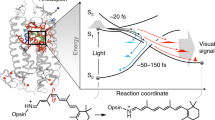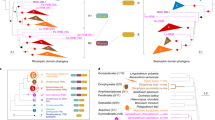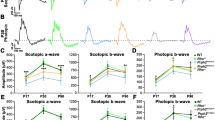Abstract
ON exposure to light, rhodopsin (visual purple, the photo-receptor pigment of low-intensity vision) is changed to lumi-rhodopsin and thence by a thermal reaction to meta-rhodopsin1. The exact nature of these substances is unknown, other than that they consist of retinene (vitamin A aldehyde) joined in some way to a protein, opsin. In order to explain the characteristic chemical and spectroscopic behaviour of lumi- and meta-rhodopsin, workers in this field have suggested1 that one, or both, of lumi- and meta-rhodopsin may be free radicals.
This is a preview of subscription content, access via your institution
Access options
Subscribe to this journal
Receive 51 print issues and online access
$199.00 per year
only $3.90 per issue
Buy this article
- Purchase on SpringerLink
- Instant access to the full article PDF.
USD 39.95
Prices may be subject to local taxes which are calculated during checkout
Similar content being viewed by others
References
Wald, G., Durell, J., and St. George, R. C. C., Science, 111, 179 (1950). Collins, F. D., and Morton, R. A., Biochem. J., 47, 18 (1950).
Commoner, B., Townsend, J., and Pake, G. E., Nature, 174, 689 (1954).
Collins, F. D. Love, R. M., and Morton, R. A., Biochem. J., 51, 292 (1952).
Author information
Authors and Affiliations
Rights and permissions
About this article
Cite this article
PITT, G., TINKHAM, M. Lumi- and Meta-Rhodopsin. Nature 176, 220–221 (1955). https://doi.org/10.1038/176220a0
Issue date:
DOI: https://doi.org/10.1038/176220a0



